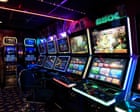Flaws in a scheme meant to help gamblers bar themselves from24-hour slot machine shopshave been described by the industry regulator as “very concerning”, following revelations in a BBC documentary.
The Guardian has previously revealed how gambling operators areexploiting favourable planning and licensing lawsto flood UK high streets with “adult gaming centres” (AGCs), which are disproportionatelyconcentrated in the poorest areas.
The shops must offer self-exclusion schemes to customers who fear they have a problem with slot machines, which are consistently linked with higher rates of addiction than products such as sports betting.
But a documentary byBBCFile on 4 Investigates, due to be broadcast on Tuesday evening, found that in one UK city 13 out of 14 venues failed to implement the scheme properly.
An undercover reporter for the programme signed up to exclude himself from all AGCs within a 40km radius of Game Nation, a slot machine venue in Portsmouth. He was prevented from entering the Game Nation branch soon after, indicating that the company’s self-exclusion scheme worked.
That attempt to breach the self-exclusion should havetriggered a warning to all staff in “neighbouring” venues, including those owned by other companies, according to Gambling Commission guidance.
But despite the initial self-exclusion – followed by the subsequent attempt to breach it – the reporter was able to walk into 13 other venues and use the slot machines, including a branch of Merkur Slots just 100 metres away.
Staff at the branch of Merkur, the UK’s second-largest AGC operator after the Austrian-owned Admiral, offered to help him play the machines and bring him snacks.
Merkur, owned by the German gaming company Gauselmann, wasfined almost £100,000this year after theGuardian revealed that staff allegedly exploited a terminally ill cancer patient, who has since died.
A spokesperson for theGamblingCommission said: “We take protecting consumers extremely seriously.”
Sign up toBusiness Today
Get set for the working day – we'll point you to all the business news and analysis you need every morning
after newsletter promotion
The regulator said the findings of the documentary were “very concerning and we will be taking urgent steps to investigate what has happened”.
It added: “Alongside our work, local authorities licence premises in their local areas and are funded, through the licence fee they charge, to inspect gambling business in their area to ensure those businesses are compliant.”
Merkur said: “As a business we work within the confines of the industry self-exclusion scheme and always follow best endeavours to support customers who have voluntarily or otherwise decided to enter into the industries [sic] self-exclusion schemes.”
